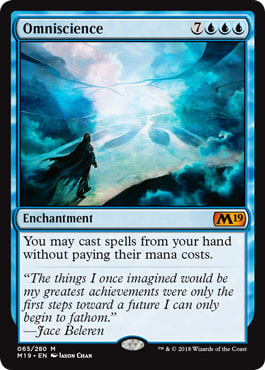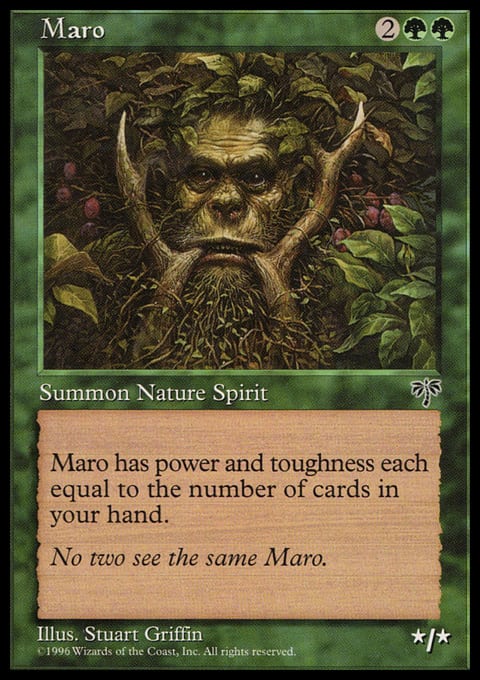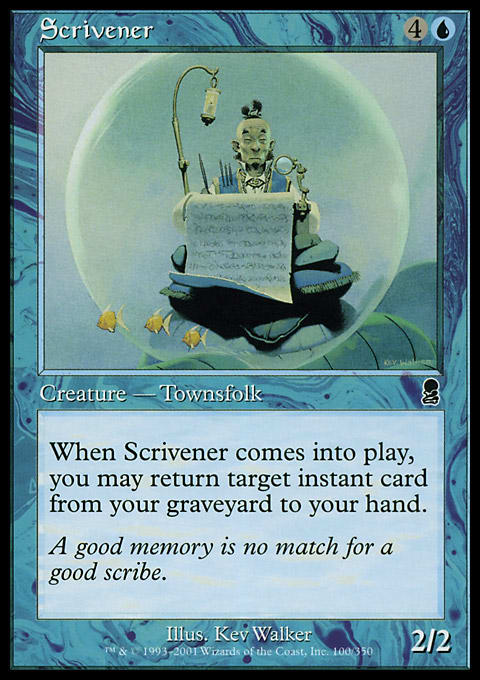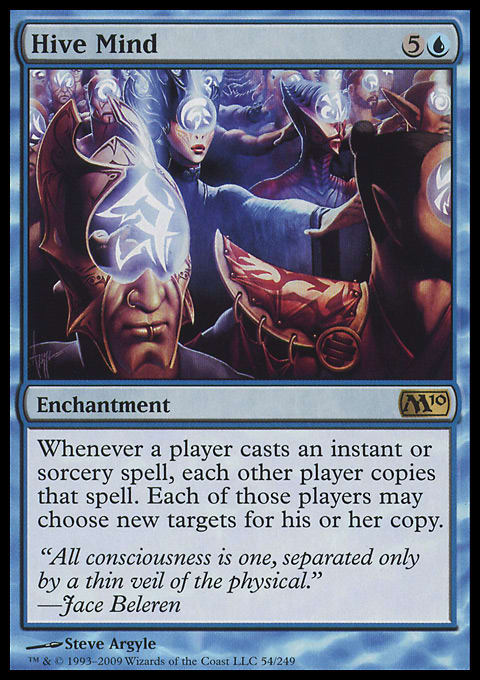Everything
I'm not going to talk about everything in this article. I don't have the patience to discuss everything. I don't even know everything! I'm not even sure of what I don't know!
For instance, when I sit across from an opponent most of the time in competitive Magic, I don't even know what deck they're playing. I bet the same holds true for you, doesn't it, reader? Most of the time, anyway?
Forget everything.
Let's talk about metagaming, instead.
Metagaming
So, what is "metagaming," anyway? What do we mean by such a word?
The most prepared Magic player in a given game, match, or tournament is essentially the one who has most optimized their total relevant data set. It's where you hypothesize the most likely environment and make your strategic decisions based on this information.
Serious question, though: how detailed do you bother to make your metagame model when you're preparing? At what point does knowing too much stop helping you win? Instead of trying to think up your most likely matchups over the course of seven or eight or nine rounds, couldn't you have been playing more games with that time? Is that smarter? How do you know how much time to spend with each activity? And what about all those things you don't know and can't know you don't know? How would you try to become more aware of what you didn't know, assuming it was possible to know it?
There's no part of this that isn't technically metagaming.
Real quick, here's a Commander deck. Look at it.
Chulane, Teller of Tales | Commander | David McDarby
- Commander (1)
- 1 Chulane, Teller of Tales
- Creatures (47)
- 1 Admonition Angel
- 1 Apex Altisaur
- 1 Archon of Absolution
- 1 Azorius Aethermage
- 1 Benevolent Bodyguard
- 1 Bygone Bishop
- 1 Caustic Caterpillar
- 1 Chameleon Colossus
- 1 Courser of Kruphix
- 1 Crafty Cutpurse
- 1 Crystalline Crawler
- 1 Cyclone Summoner
- 1 Deputy of Detention
- 1 Devoted Druid
- 1 Dragonlord Dromoka
- 1 Filigree Familiar
- 1 Gilded Goose
- 1 Gorm the Great
- 1 Honored Hierarch
- 1 Isperia the Inscrutable
- 1 Keeper of Keys
- 1 Kestia, the Cultivator
- 1 Lashweed Lurker
- 1 Meddling Mage
- 1 Mentor of the Meek
- 1 Pentarch Paladin
- 1 Primeval Protector
- 1 Risen Reef
- 1 Sakashima's Student
- 1 Selfless Spirit
- 1 Selfless Squire
- 1 Silhana Starfletcher
- 1 Silkwing Scout
- 1 Silumgar Sorcerer
- 1 Simic Sky Swallower
- 1 Siren Stormtamer
- 1 Soldevi Sentry
- 1 Solemn Simulacrum
- 1 Somberwald Sage
- 1 Soul Seizer
- 1 Spellstutter Sprite
- 1 Stingerfling Spider
- 1 Stonecoil Serpent
- 1 Sylvan Safekeeper
- 1 Tireless Tracker
- 1 Whisperer of the Wilds
- 1 Wild Wanderer
- Instants (1)
- 1 Brought Back
- Sorceries (3)
- 1 Broken Bond
- 1 Dusk // Dawn
- 1 River's Rebuke
- Enchantments (4)
- 1 Cathars' Crusade
- 1 Font of Fertility
- 1 Sight of the Scalelords
- 1 Weirding Wood
- Artifacts (5)
- 1 Helm of the Host
- 1 Selesnya Signet
- 1 Simic Signet
- 1 Spectral Searchlight
- 1 Warden of the Wall
- Lands (39)
- 1 Forest
- 1 Island
- 1 Plains
- 1 Adarkar Wastes
- 1 Alchemist's Refuge
- 1 Ancient Tomb
- 1 Azorius Chancery
- 1 Breeding Pool
- 1 Brushland
- 1 Celestial Colonnade
- 1 Command Tower
- 1 Flooded Grove
- 1 Flooded Strand
- 1 Glacial Fortress
- 1 Hallowed Fountain
- 1 Hinterland Harbor
- 1 Horizon Canopy
- 1 Krosan Verge
- 1 Minamo, School at Water's Edge
- 1 Mirrorpool
- 1 Misty Rainforest
- 1 Mosswort Bridge
- 1 Mystic Gate
- 1 Path of Ancestry
- 1 Rogue's Passage
- 1 Savannah
- 1 Seaside Citadel
- 1 Selesnya Sanctuary
- 1 Simic Growth Chamber
- 1 Skycloud Expanse
- 1 Sungrass Prairie
- 1 Sunpetal Grove
- 1 Temple Garden
- 1 Tropical Island
- 1 Tundra
- 1 Waterlogged Grove
- 1 Windswept Heath
- 1 Wooded Bastion
- 1 Yavimaya Coast
Okay, back to metagames.
One way to become more aware of an expected metagame is to look at the various levels in which you're analyzing a problem. For instance, if a format you're preparing to play in seems to have the character of mostly combo decks with no interaction, that's one level. If you know all the local players you're going to interact with because you playtest together, that's a different, more social level. If card availability is an issue with this format in your area, that's another kind of level altogether.
There's no limit to the amount of potential information we might apply to the context of a specific competitive Magic quest. That means it's up to us to decide how to use the time and resources we have.
As a fun exercise, you might try to think of all your expectations for various tournaments you can remember from your past, and then try to think of all the various moments you had during the event where completely new and noteworthy information hit you. How often was the information something you could've known prior if you'd spent time thinking about different levels of Magic metagaming data?
The Fine Line Between Too Serious and Too Cute
There's a staff writer at CoolStuffInc that has a problem: they take themselves both not seriously enough and too seriously. They're too cute and too serious, and there is not much in between going on anymore. It's one of the things that most hinders their drive to work.
This is the worst-case scenario for someone trying to be useful.
Another way to look at this writer's problem is through incentives. Perhaps they have a misalignment of incentives in their writing.
That's their problem, though. Here's another deck.
It's a Pauper Commander deck, for those looking to change up the pace some:
Skarrg Guildmage | Pauper Commander | Coca_Jambon
- Creatures (37)
- 1 Ancient Brontodon
- 1 Citanul Woodreaders
- 1 Civic Wayfinder
- 1 Conclave Naturalists
- 1 Copper Myr
- 1 Elvish Visionary
- 1 Emrakul's Hatcher
- 1 Excavating Anurid
- 1 Fangren Marauder
- 1 Farhaven Elf
- 1 Fertilid
- 1 Flamewave Invoker
- 1 Goblin Anarchomancer
- 1 Goblin Bushwhacker
- 1 Goblin Matron
- 1 Grazing Gladehart
- 1 Greater Sandwurm
- 1 Heart Warden
- 1 Ilysian Caryatid
- 1 Iron Myr
- 1 Joraga Visionary
- 1 Kozilek's Predator
- 1 Lavafume Invoker
- 1 Llanowar Visionary
- 1 Migratory Greathorn
- 1 Nest Invader
- 1 Orcish Lumberjack
- 1 Primordial Wurm
- 1 Rhox Oracle
- 1 Ruination Wurm
- 1 Sarulf's Packmate
- 1 Shinen of Life's Roar
- 1 Silverback Shaman
- 1 Skarrg Guildmage
- 1 Ulamog's Crusher
- 1 Wood Elves
- 1 Yavimaya Elder
- Instants (11)
- 1 Band Together
- 1 Blinding Fog
- 1 Broken Wings
- 1 Plummet
- 1 Rally the Forces
- 1 Ram Through
- 1 Ranger's Guile
- 1 Rending Vines
- 1 Sheltering Word
- 1 Smash
- 1 Snakeskin Veil
- Sorceries (12)
- 1 Cultivate
- 1 Explore
- 1 Far Wanderings
- 1 Ground Assault
- 1 Growth Spasm
- 1 Hull Breach
- 1 Kodama's Reach
- 1 Rabid Bite
- 1 Rampant Growth
- 1 Scale the Heights
- 1 Tectonic Rift
- 1 Warlord's Fury
Just so you're aware: these decks I'm showing you are made of Magic cards that you can own yourself. You can buy them from a local game store or you can order them from retailers or individual sellers, mostly on the internet.
An economical metagame is called a "market."
If everyone is playing Commander but nobody is playing Standard at a game store you run, you would say that the market is good for Commander (cute format) but not Standard (serious format). That's your money metagame right there. Adjust your incentives accordingly.
Hey, speaking of incentives, that reminds me.
The public-facing mouthpiece for Magic likes to do podcasts in his car while he's going to his job. It sounds unsafe the more I think about it, but he's a functioning adult with some practice, so it's probably fine. I'm not driving around Washington anyway - my road meta is different - so ultimately, it's someone else's problem, and I have no incentive to feel otherwise.
What I like about these Magic podcasts most is that they seem very superfluous in a genuine, creative way; I feel as if the project is being done because the host purely wants to do it. I can't find (m)any hidden incentives, and that's just the best feeling.
Off the road and on the water, one of this same guy's Wizards of the Coast admin colleagues was on a cruise ship ten years ago, giving a presentation, explaining why Lorwyn wasn't all that hot of a Magic product. Basically, he said it was too cute. Magic players want stuff that leans a little more badass, a little more powerful. A little more serious.
Think Dragons, not teddy bears.
Not long afterward, completely independent of that cruise ship conference, Magic retailers started putting out Magic accessories that had squirrels, kittens, and baby elephants all over them. These days, most Magic sets have cute monkeys, homunculi, and as many squirrels as humanly possible in them. That's a good adjustment, but it always confuses me why the data was so wrong before. Why did they think Magic players didn't like cute things? Why did they think we were all too serious for that?
Do they even know us?!
Yes, but they don't know everything. There are too many tangled incentives in the way.
Magic might be at its best when it's balancing cute and serious evenly:

Punitive Damage
A really good therapist could do a lot with how irked I am by the Magic community's love of puns. I'm not unhealthy about it or anything. I'm aware it's a crazy thing to notice enough to care, so it's managed. It's nothing to worry about. I don't judge anyone for it. I have the problem, not everyone else, and I'm working on it.
Okay?
Okay.
It does annoy me, though. I'm going to tell you why but not yet.
First, I'm going to post a deck from longtime friend and co-writer at CoolStuffInc, Ali Aintrazi. He's a respected deck-builder where you can't tell the cute from the serious. He might warrant the same description as a person, now that I think about it.
Sultai Delirium | Historic | Jonathan Lady
- Creatures (26)
- 2 Champion of Wits
- 2 Merfolk Secretkeeper
- 2 Polukranos, Unchained
- 4 Fiend Artisan
- 4 Narcomoeba
- 4 Silversmote Ghoul
- 4 Skyclave Shade
- 4 Stitcher's Supplier
- Instants (8)
- 4 Brainstorm
- 4 Grisly Salvage
- Sorceries (6)
- 2 Driven // Despair
- 4 Creeping Chill
- Lands (20)
- 1 Forest
- 1 Island
- 1 Swamp
- 2 Drowned Catacomb
- 2 Hinterland Harbor
- 2 Woodland Cemetery
- 3 Overgrown Tomb
- 3 Watery Grave
- 4 Breeding Pool
- 1 Phyrexian Tower
- Sideboard (15)
- 4 Thoughtseize
- 1 Assassin's Trophy
- 2 Fatal Push
- 2 Mystic Repeal
- 2 Mystical Dispute
- 2 Cling to Dust
- 2 Negate
That's a pretty cool deck!
All right, time is up. I'll lay it out right here:
The reason Magic puns annoy me is because they're so necessarily referential, which is cool, but when everything is a reference of a reference of a reference, it loses all its uh... spark. We don't have identities in that kind of world wherein everything is just tribute after tribute; we just cling to the past again and again and again, never making new ground in the right way. I don't want that for Magic.
Look at Modern Horizons 2, a set I find really, really fun to draft and mess with. It might've been a 10/10 product with a little help, but its fellow Magic products these days are already so... cute? They have references to Godzilla, or ancient Greece, or ancient Egypt, or most commonly of all, earlier Magic stuff. It's hard to have sincerity and evolution in all that clinging to other people's ideas. Modern Horizons 2 was all references, as far as I know, but isn't most Magic today inclusive of references and puns wherever they can be had?
Puns are all cute, no serious.
Where is Magic's identity in all these references on references on references? Is it still in there somewhere?
Show me some sincerity, someone. (I show plenty.)
Woe, Be Gone
So, this CoolStuffInc writer, the one that can't do anything but be too cute or too serious anymore, he asks some friends what they want to read about. One of them says metagaming.
"I feel like that's two sentences, not a full article," the writer says. "I could define metagaming for a reader, but then what?"
The requester replies that a lot of subjects could technically only last a few sentences; however, this writer frequently takes an elementary part of the Magic experience and expounds on it in a deeper way.
The writer wondered: What's the meta of a Magic itself? What is the "meta" metagame? Is it literally everything? How the hell does one write about everything?
The writer decided they just have to accept they can't. In fact, the first thing a deep dive metagame article should do before talking about metagaming is make sure the audience knows that it's impossible to cover everything, but...
Metagaming is pretty much everything.
It's fashion, it's the things it's okay to say in public, it's the music it's cool to like.
It's how your body keeps you alive: It makes its best guess as to what your environment is, and if it's wrong, you get to lose.
Most Everyone Thinks Alike
The true reason Wizards of the Coast reps had the wrong data about cute stuff way back when was probably a misguided incentive. We model events with big sweeping narratives, but if you zoom in out of the meta-level, you see any number of things you could never have been aware of from a further away vantage point. Most of the invisible things moving the world and determining what shapes and patterns it takes on are born of incentives.
Incentives shape the metagame of our lives.
Flawed methodology in gathering data, rushed deadlines, pressure from outside forces with their own incentives...all of these things are what truly happen beneath the surface of even our best guesses at what's going on around us. We do it every time we metagame for anything.
So, what's the best you can do with so many unknowns in the tournament hall, in life?
Take the following shortcut:
Everything is about incentives. If you understand the incentives of others, you can make stronger predictions about their behavior.
What decks are players with the best epistemology going to be most likely incentivized to play? What about the players with the worst epistemology? Do you have the self-awareness to know which of these polarities you're closer to? How do you know?
Make Everyone The Audience
The CoolStuffInc writer is still skeptical about this entire premise. It sounds convoluted, complicated. It sounds tricky, even for someone who is into these kinds of exercises.
It sounds a little... too cute? Maybe if I just take it seriously enough...
Isn't there a better way to explore the nature of what it is to metagame? What if readers are just looking for puns because that's where their incentives are? What if they don't care about deep diving on the nature of metagaming?
The writer decided as long as the piece included some decklists, some Magic card pictures that served the theme, and subtle some cross promotion, it'd turn out fine and mean something to someone, even if it was just him. You never know what will mean everything to somebody someday.
Maybe the article could even drive it all home with some wordplay right at the end. You know, for the road.
(~_^)
The Rascal
The Indestructible Danny West



































